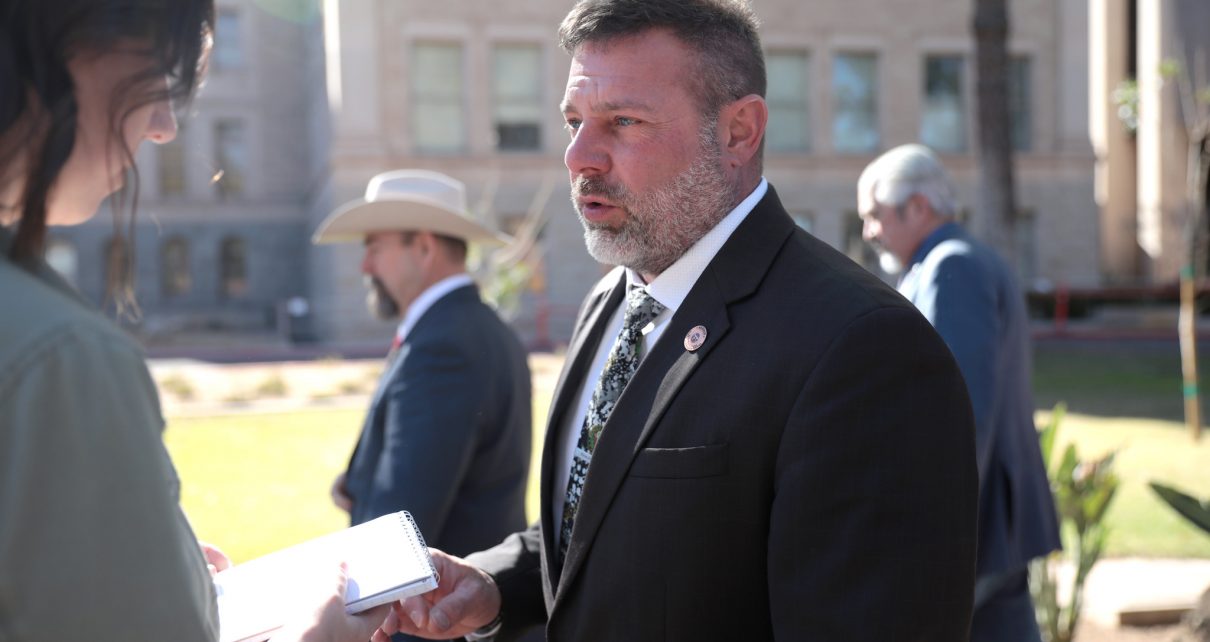
State Representative John Gillette speaking with the media at a press conference hosted by Border 911 at the Arizona State Capitol building in Phoenix, Arizona. (Gage Skidmore)
Gilllette Echoes Trump’s Call for American Chips Manufacturing
Touts TSMC’s success in full-throated endorsement of Trump plan
By Christy Kelly, August 11, 2025 6:00 am
Rep. John Gillette told the Arizona Globe that Arizona’s semiconductor surge is no accident. “Arizona is winning, and we should say it plainly,” Gillette said. “The Trump Administration first put TSMC on a path to Arizona in 2020, and that decision catalyzed the state’s modern semiconductor boom.”
That original $12 billion project, Gillette noted, “has multiplied into a multi-fab campus that’s now the single largest foreign direct investment in U.S. history.” With three advanced fabs, plus advanced packaging and R&D, the total U.S. commitment is now roughly $165 billion. “That means thousands of high-wage jobs, a deep supplier ecosystem, and a durable manufacturing base that puts Arizona at the center of America’s tech resurgence,” he told the Globe.
Gillette pointed out that in March, former President Trump stood with TSMC leadership at the White House to announce “a fresh $100 billion U.S. expansion plan that includes additional fabs and advanced packaging here in Arizona.” According to Gillette, “Fab 1 is already in production on 4/5 nanometer chips, Fab 2 is targeting 3 nanometer in 2028, and a third fab will aim for 2 nanometer/A16 by the end of the decade. These are exactly the kinds of capabilities we need onshore.”
While acknowledging that CHIPS Act incentives—$6.6 billion in grants and up to $5 billion in loans—played a role, Gillette emphasized to the Globe that “the original TSMC-to-Arizona decision and the national security framing began in 2020 under President Trump. That set the table for everything that followed. Arizona’s wins aren’t an accident, they’re a strategy.”
Gillette warned that the U.S.–China tech contest has only intensified. “Beijing is racing to replace foreign tech and dominate critical inputs,” he said. “Export controls help, but loopholes remain, and China still leverages choke points like rare earths and mature-node capacity. If we remain dependent on foreign-sourced materials, tooling, or markets, we’re vulnerable.”
He told the Globe that recent federal licensing decisions on AI chips to China “show how quickly policy can whipsaw under industry pressure. This back-and-forth exposes our risk if we don’t have a fully domestic supply chain.”
The Proposal: An America-Only Secure-Chip Line
Gillette is calling for a $300 million state-plus-federal package to fund a smaller, strategically vital Arizona-based “America-only” chip factory. “No foreign equity. No foreign IP strings. No rare-earth dependency from China or unstable suppliers,” Gillette said. “We need materials and advanced nano-metals sourced from U.S. remediation and American producers, with a strict, auditable supply chain.”
He stressed that the goal is not volume but security: “This line isn’t about chasing commodity volume; it’s about mission chips—secure microelectronics for defense, energy, critical infrastructure, and election systems. These chips need anti-tamper features to resist reverse engineering and self-protect if compromised.”
Gillette told the Globe there are three main reasons for the project:
- “True sovereignty. The flagship fabs are excellent for jobs and GDP, but the nation still needs a domestically controlled, export-proof secure supply line for critical systems.”
- “Resilience. If Beijing retaliates economically or in the materials market, an America-only line shields our most sensitive programs.”
- “Innovation. A secure line anchored in Arizona pulls in U.S. equipment makers, packaging, and materials firms—accelerating homegrown capability outside foreign leverage.”
Gillette said he has repeatedly reached out to Senator Mark Kelly and Senator Ruben Gallego on these security concerns and the “America-only” proposal. “Not one returned call, letter, or even a staff email,” he told the Globe. “That silence is unacceptable given the stakes. Absolutely useless.”
Gillette credits Trump’s strategy with bringing advanced chipmaking to Arizona. “We should welcome the jobs, the skills pipeline, and the supplier growth,” he said. “But national security demands we go further—right now—by funding a parallel, 100% American-made secure-chip facility in Arizona with U.S.-sourced materials and zero foreign ownership. That’s how we lock in the gains, close the vulnerabilities, and ensure the chips running America’s defenses, grids, and elections are truly ours.”
- AZs GOP CD1 Primary Expands as Feely Switches Races - December 31, 2025
- Shamp Sponsors ‘Trump Derangement Syndrome’ Study Bill - December 26, 2025
- SCOOP: Gillette Asks Locals to Assist ICE in Grade School Assault - December 23, 2025




